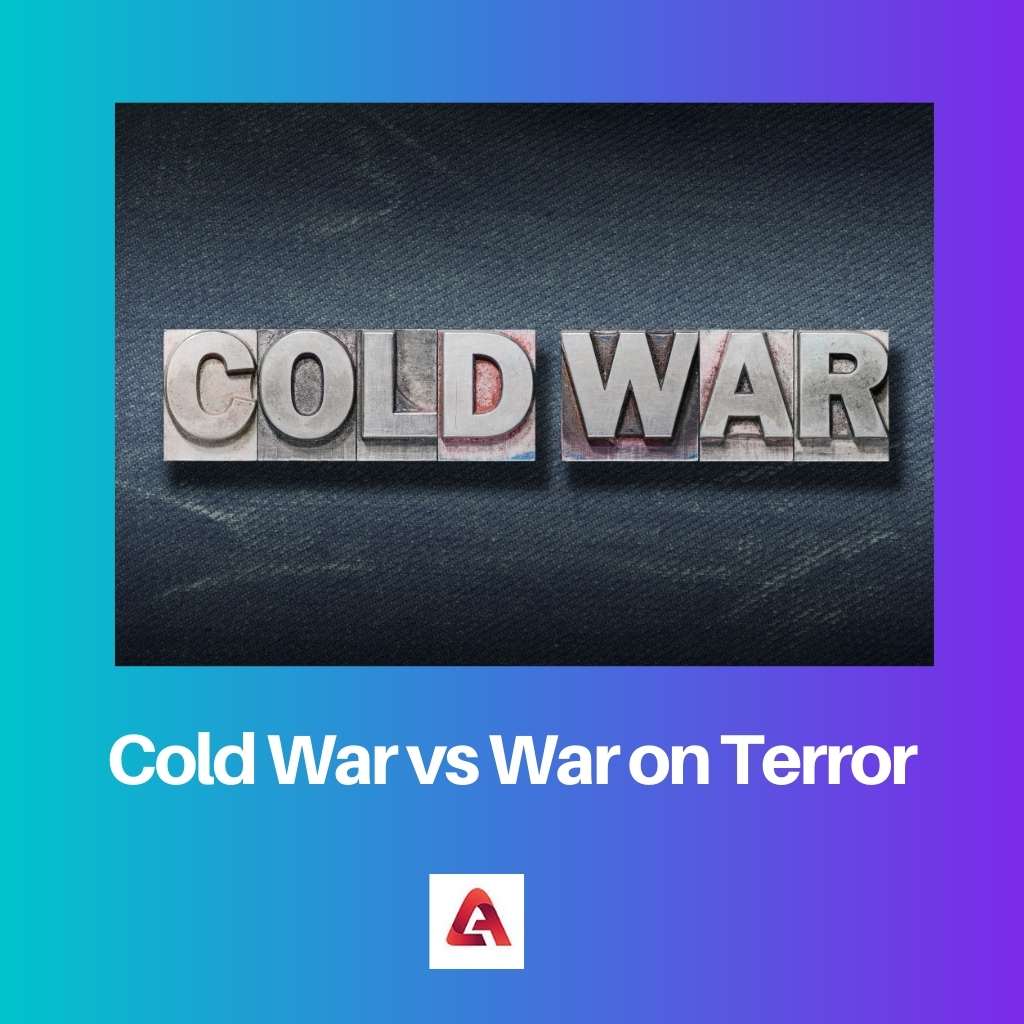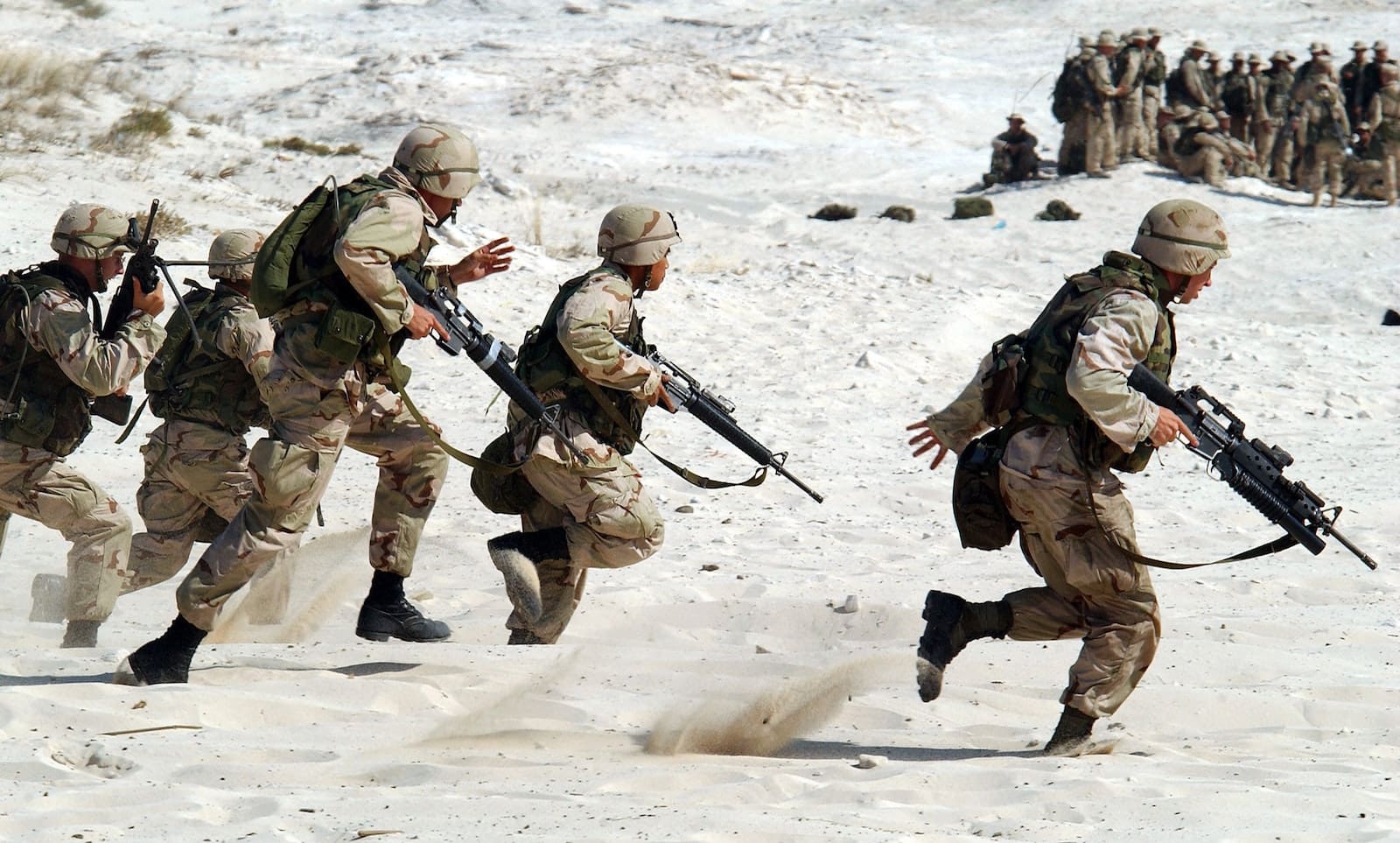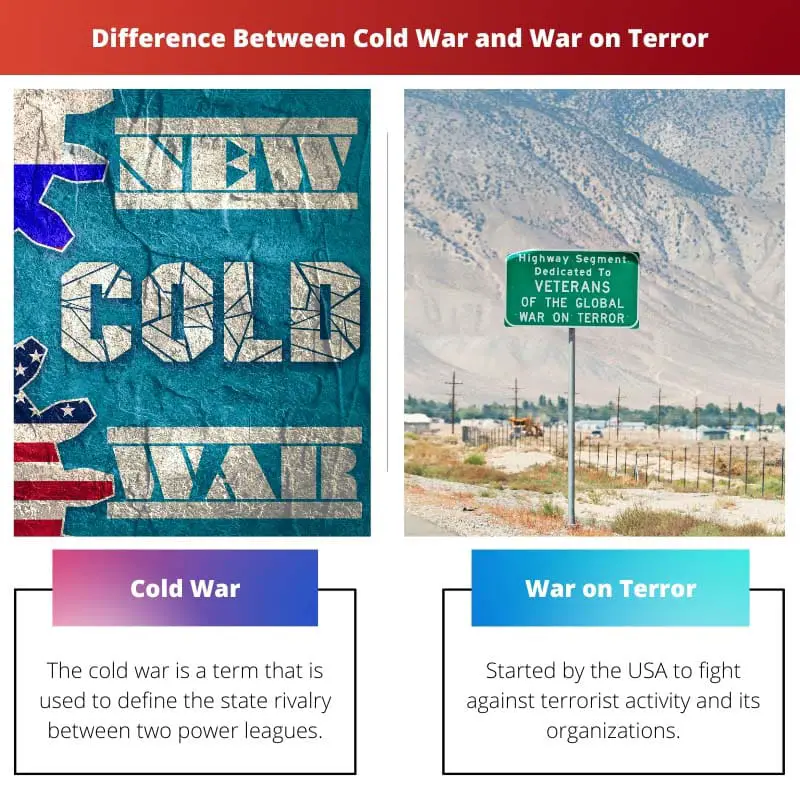There is a lot of difference between the Cold War and the War on Terror. Although both are related to war, there is a difference in the setting of both wars.
Since the middle of the 20th century, every country wants to have nuclear power to show its superiority on the world stage. Right after World War II Countries like the USSR and now Russia were trying to become a nuclear power.
In the Below section, we would see the detailed difference between the cold war and the War on terror.
Key Takeaways
- Cold War was a political and military standoff between the United States and the Soviet Union.
- The War on Terror is an ongoing campaign against global terrorism led by the United States.
- Cold War focused on preventing nuclear conflict, whereas War on Terror targets non-state actors and extremist groups.
Cold War vs War on Terror
The Cold War was a period of political and military tension between the United States and the Soviet Union that lasted from the end of World War II in 1945 until the early 1990s. The War on Terror refers to the ongoing military campaign launched by the United States and its allies.

The Cold War is a type of war when two countries have a conflict of interest on a global stage. Conflict could be in becoming nuclear power superior or military conflict, etc.
This word has come into existence in the early 20th Century and it’s primarily used to describe the tension between European countries.
Another name for the War on Terrorism (WoT) is the Global War on Terrorism. It is a type of military operation that started after the attack on America.
It was started as a response to the 11 September attacks. The main goal of this campaign was to eliminate the Al Qaeda group, and other Islamic terrorist groups.
Comparison Table
| Parameters of comparison | Cold War | War on Terror |
|---|---|---|
| Definition | The cold war is a term that is used to define the state rivalry between two power leagues. | Started by the USA to fight against terrorist activity and its organizations. |
| Starting date | It was first used in the 1930s to describe the tension between the countries | It started after the terrorist attack on 11 September 2001. |
| Cause | The main reason for the Cold War started to stop the Soviet Union from spreading communism and to promote democracy. | The main reason why terrorist activities started was because of too much involvement of the USA in middle east countries. |
| Period | The Cold War period was considered from the 1947 Truman Doctrine to 1991. | It started in 2001 and is still going on. |
| Consequences | The disintegration of the Soviet Union was a major consequence of the Cold War. | Its major outcomes were security, human rights, international law, cooperation, and governance. |
What is the Cold War?
Cold war could be defined as the state of political or military or finance differences between two countries or power leagues involving threats, propaganda, economic situation.
The cold war is always a non-violent activity between the countries.
Cold war, this term is used not because it is a great war between two big developed countries and their allies, but because they supported different beliefs tried to impose on others, and hence they are also described as proxy wars.
English writer George Orwell was the first writer who had used the term Cold War in his essay “You and the Atomic Bomb” even though it’s been in existence since the 1930s.
Different historians give their different opinions about its duration. Most historians consider it to be during the World War II period 1940-1945.
Some believe that the Cold War evolved from the Russian Revolution that took place in 1917.
The reduction in Cold War tensions occurred roughly between 1953 and 1957.
The main reason for this reduction in tension was the death of the dictator of the Soviet Union, Joseph Stalin, but even after that, there was a little deadlock.
In 1955 a unified military organization was formed between the countries of the Soviet Union. A short phase of the Cold War continued in 1958-62 as well.
What is the War on Terror?
War on Terrorism, the term was used for a counter-terrorism campaign launched in response to the terrorist attack on 11 September 2001. The impact of this war was on expenditure, international relations.
The main purpose of this war was to represent political relations. Its consequences were international law, cooperation, governance, etc.
This war was in a way a multidimensional campaign of unlimited scope.
The phrase “War on Terrorism” was used primarily to refer to organizations identified as terrorists and to military operations against them by the United States, Britain, and their allies.
It does not cover other terrorist operations such as Russia and India. The War on Terrorism is referred to by other names too.
After the September 11 attacks, the US government began a program called “extraordinary performances” in which irregular singing was performed as a forced performance.
The main objective of this extraordinary program was to conduct torture operations on the captives.
The notion of a “war on terror” was controversial, with many critics believing it to be a violation of civil liberties and human rights as the war involved US government torture, extrajudicial representations, and drone strikes.
Due to this, civilians were also dying along with the terrorists. The number of participating countries in the critics was 54.

Main Differences Between Cold War and War on Terror
- The cold war is between two countries because of their conflict of interest however war on terror is to fight against terrorism at the global level.
- The cold war started after the second world war while the war on terror started after the terrorist attack on 11 September 2001.
- The main purpose of the Cold War is to prevent the Soviet Union from spreading communism and to promote democracy whereas the main purpose of the war on terror was to represent political relations.
- The Cold War period was considered from the 1947 Truman Doctrine to 1991 while the war on terror started in 2001 and is still going on.
- The disintegration of the Soviet Union was a major consequence of the Cold War whereas security, human rights, international law, cooperation, and governance were the major outcomes of the war on terror.

- https://www.sciencedirect.com/science/article/pii/S0304387809001011
- https://onlinelibrary.wiley.com/doi/abs/10.1111/j.1467-7660.2007.00446.x
- https://www.tandfonline.com/doi/abs/10.1080/10242690601025526

It is important to understand the underlying history behind these two major events. Thank you for the insightful comparison.
I agree, Tmatthews, these comparisons provide valuable insights into global history.
The Cold War period was an intense time in global history. It is interesting to compare it to the War on Terror which is still an ongoing event.
The intricate details presented in the comparison table are particularly illuminating.
The documented differences further emphasize the complexity of these historical events.
The comprehensive references used in this article offer a well-researched perspective on the topic.
This comparison brings a new level of nuance to understanding the historical contexts.
I appreciate the evidence-based approach to analyzing the Cold War and the War on Terror.
The analysis presents compelling arguments that highlight significant differences in these impactful global events.